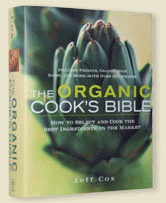What If?
Organic Lifestyle Comments Off on What If?
Organic farming and gardening represents a shift in thinking that can apply broadly to all the activities of life, bringing life-supporting perspective to actions by individuals, groups, and institutions.
It really involves moving beyond a human-centered point of view to a holistic view. The big problem with the human-centered point of view is that the end (human improvement of some sort) justifies the means. For example, in conventional farming and gardening, human beings have mastery over the farm and garden and all the creatures that affect them.
And that means lots of killing. Look at the words we use for the levers conventional agriculture applies to nature to grow our crops: pestiCIDES, herbiCIDES, fungiCIDES, ANTIbiotics. In other words, we kill off every life form except the desired crops.
The holistic view means that we study the way nature works and then try to emulate her in our farming and gardening, using the most benign methods first, and harsher methods only up to the point that we don’t cause damage to the web of life. The organic grower knows that if it takes wholesale slaughter to grow a crop, it’s best to find another crop to grow. And emulating nature means that the entire force of natural law is brought in to strengthen the process. Killing everything except the crops does exactly the opposite—it tries to defeat nature.
Instead of killing everything but the crops, organic growers promote biodiversity—nature’s system of checks and balances that produces natural good health. The soil is not just material that props up crops until we can flood them with soluble chemical fertilizers and plant and animal poisons. It is a living system that we enrich so that it too has a huge biodiversity that feeds plants what they want, in the amounts they want, when they want it. That’s what nature does. That’s a healthy ecology whether on the farm, in the garden, or out in wild nature.
Okay—that works for farming and gardening. Can it work in another area of life, such as social interaction? Lately, we’ve seen some horrific examples of the police function. A frightened cop is a very dangerous cop. I just saw a YouTube video of a guy pumping gas into his truck who was approached by a cop who challenged him. The guy reached into his truck for his ID, and the cop shot him down.
Michael Brown maybe gave Darren Wilson some lip or even tried to turn his gun away (who knows?), but Wilson unloaded his service revolver on the unarmed kid and you know the rest of the story. Killing. Over and over and over. Even right here in Santa Rosa, California, not more than 12 miles from me, a Latino kid with a plastic rifle was murdered by a Santa Rosa cop who thought maybe that thing was real.
What does the organic approach tell us about law enforcement? What, for instance, might Darren Wilson have done when an unarmed teenager displeased him? Now Wilson says he feared for his life, and that Brown was trying to wrest the gun from his hand. And that the next thing Wilson saw happening was that he was going to be murdered by this kid. I personally don’t believe a word of it, but let’s say, for the sake of argument, that Wilson’s telling the truth.
Let’s back up here. Let’s say Michael Brown and friends were walking down the street, blocking the roadway, and maybe giving the officer typical teenage attitude.
Let’s say Officer Wilson asked them to move off the street to legitimately open the roadway to traffic. Let’s say Michael Brown told him to shove it. Maybe at that point, Officer Wilson might have told young Mr. Brown that he was going to get a ticket for blocking a public roadway. Maybe Mr. Brown told Officer Wilson, “Yeah? Let’s see you give me a ticket.”
I’m not saying Brown actually said this, I’m just saying that sometimes teenagers can be a handful of badass.
Maybe Officer Wilson could have seen the big picture. Brown lives in his town. He knows where to find him. Brown was ignoring a lawful request by the cop to clear the street. The cop’s options were many. He could have gone to Brown’s parents and given them the summons. He could have called for backup and arrested Mr. Brown for non-cooperation with a law enforcement officer’s legitimate request, taken him to the cop shop, and arraigned him. It was, after all, a misdemeanor. In other words, Wilson could have used the least violent strategy first, then moved, step by careful step, to achieve the lawful aim of preventing blockage of a street to public traffic.
Why was Wilson’s gun even out in the first place? But it was out and, Wilson says, he and Brown were wrestling for control of it. So Officer Wilson shot and killed young Mr. Brown, an unarmed teenager, in what was obviously an emotional flareup. Isn’t that a lot like producing food by killing everything in the field except the crop?
What makes the situation so gut wrenching is the response of the prosecutor and the grand jury. It’s just so pitifully and painfully obvious that the white powers that be rigged the game from the outset, to make sure that the white cop walked.
Think I’m exaggerating? In addition to his duties as the St. Louis County prosecutor in charge of prosecuting Officer Darren Wilson, Robert McCulloch is also the President of The Backstoppers, an organization used to fundraise for police men and women in both Missouri and Illinois. Last August, his organization was affiliated with a T-shirt drive featuring a picture of Missouri and the statement, “I SUPPORT OFFICER D. WILSON,” which was set up to raise money for the Darren Wilson Defense Fund as well as The Backstoppers. So, the prosecutor charged with discovering whether Officer Wilson is guilty of murder is raising money for the cop being investigated.
Any parallels with the agricultural powers that be called Monsanto, Dow, Syngenta, and the other dealers in agricultural poison? You decide. The organic solution would have been to leave the gun in the holster and give Mike Brown a ticket, not fire 12 bullets into him for a misdemeanor.
***
‘NO GMO’ CHIPS TURN OUT TO BE LOADED WITH GMOS
Xochitl, a company that makes tortilla chips, has gained a foothold in grocery stores across the United States in large part because of two words added to its package to reassure consumers: “No GMO.”
Its website shows that the chips are now in grocery stores across the country, and both organic and non-organic varieties are offered (both say “No GMO” on the bag). But according to a recent test conducted by Consumer Reports, the company has been lying about that important distinction. The recent Consumer Reports investigation found that the non-organic (but supposedly non-GMO) varieties of the chips actually contained over 75 percent GMO corn, based on tests of six different packages.
This is why we need mandatory GMO labeling with fully defined standards and verification. Anything less is unacceptable. Food manufacturers need to be held accountable and we need to know if it’s GMO.
***
FOOD GIANTS TURN HEALTHY YOGURT INTO JUNK FOOD
A new report called “Culture Wars: How the Food Giants Turned Yogurt, a Health Food, into Junk Food,” issued by The Cornucopia Institute, accuses Dannon, Yoplait, Chobani and other major marketers of misleading parents, who are looking for healthier foods for their families, into purchasing yogurts loaded with sugar and containing a myriad of questionably safe artificial sweeteners, colors, and emulsifiers.
The group alleges that agribusiness, in its marketing approach, has capitalized on yogurt’s historic, well-deserved, healthful reputation while simultaneously adulterating the product, sometimes illegally, to gain competitive advantage and popular appeal.
In addition to The Cornucopia Institute’s comprehensive report on the yogurt industry, they also released a related buyer’s guide rating 114 brands and separating the truly healthy options from those that would be found on any dietitian’s shortlist of foods to avoid.
You can read Cornucopia’s report at http://www.cornucopia.org/yogurt/
and see its buyer’s guide at http://www.cornucopia.org/yogurt-scorecard/
***
SAN JOSE TAKES THE LEAD IN SMART WASTE TECHNOLOGY
U.S. Environmental Protection Agency and City of San José officials have toured the city’s Zero Waste Energy Development anaerobic digestion facility where food scraps are turned into renewable energy and compost for local farms.
The facility’s state-of-the-art anaerobic digesters use bacteria to break down food waste in an oxygen-free environment, converting it into methane biogas that’s burned to generate electricity. The facility can digest and compost 90,000 tons of food waste and produce 1.6 megawatts of electricity per year. San José aims to achieve zero waste by 2022 and diverts 74 percent of materials from landfills through reuse, recycling, composting, and anaerobic digestion.
***
INDIAN FILMMAKER DOCUMENTS GMO ABUSES
In his documentary, “Poison on the Platter,” Indian filmmaker Mahesh Bhatt examines how multinational corporations and government regulators have conspired to spread GE foods across India, reports Dr. Joseph Mercola’s website.
The film provides an insightful perspective about the global impact of GMOs. If you don’t believe contamination of our food supply by GMOs holds the potential for planetary disaster, you might change your mind after seeing this film. Mahesh Bhatt warns:
“In their mad rush to capture the multi-billion dollar Indian agriculture and food industry, the biotech multinational companies are bulldozing warnings by scientists about the adverse impact of GMO foods on health and the environment. This is hurtling mankind toward a disaster, which will be far more destructive than anything the world has seen so far, simply because it will affect every single person living on this planet.”
***
JUDGE BLOCKS MAUI’S LAW BANNING GMO CULTIVATION
A federal judge has ruled that Maui County, Hawaii, may not implement a new law banning the cultivation of genetically modified organisms until he considers arguments in a lawsuit against the measure.
Monsanto Co. and a unit of Dow Chemical Co. sued the county to stop the law. Employees of the companies and local Maui County businesses joined the lawsuit. They argue that the law would harm the economy and their businesses. They said the court has already ruled in another case involving a Kauai law regulating genetically engineered crops, that the state, and not the county, has jurisdiction over the issue.
Maui voters created the law with a ballot initiative. The measure was to take effect after officials certified the election results, which was expected later this month. Now both sides have agreed to delay the date the law goes into effect, U.S. Magistrate Judge Barry Kurren said in his ruling.
Kenneth Robbins, an attorney for the companies, said Kurren was saying in his ruling the plaintiffs have shown they could potentially suffer irreparable harm if the law goes into effect.
Michael Carroll, an attorney for the ballot initiative’s authors, plans to ask Kurren to hold off from deciding this case until a state court on Maui rules on a separate lawsuit his clients filed Wednesday. That lawsuit seeks to compel the county to implement the law. Carroll said Friday he’s hopeful the federal court will ultimately agree the issues should be decided in a Maui court.
###












